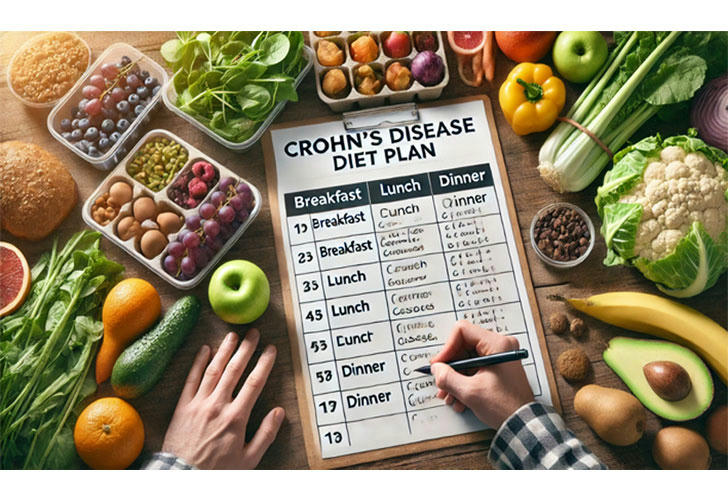What Should Patients with Crohn's Disease Eat?
Crohn's disease is a type of inflammatory bowel disease (IBD) that can cause inflammation in any part of the gastrointestinal tract. This condition can lead to symptoms such as abdominal pain, diarrhea, weight loss, and fatigue. While there is currently no cure for Crohn's disease, effective management strategies include medications, lifestyle changes, and dietary modifications.

Understanding Crohn's Disease Treatment
The treatment of Crohn's disease typically involves a combination of the following approaches:
1. Medications:
Anti-inflammatory drugs: Such as aminosalicylates (5-ASA) to reduce inflammation.
Immunosuppressants: Medications like azathioprine and methotrexate to suppress the immune response.
Biologics: Target specific components of the immune system (e.g., anti-TNF agents like infliximab).
Corticosteroids: Used to manage flare-ups and reduce inflammation.
2. Nutritional Therapy:
Exclusive Enteral Nutrition (EEN): A liquid diet that provides complete nutrition through formula drinks, often used to induce remission in children and adults.
Crohn's Disease Exclusion Diet (CDED): Focuses on eliminating certain foods that may exacerbate symptoms while allowing a variety of other foods.
3. Surgery: In some cases, surgery may be necessary to remove damaged sections of the intestine.
4. Lifestyle Modifications:
Regular exercise, stress management, and avoiding smoking can help manage symptoms.
Recommended Foods for Crohn's Disease Patients
When managing Crohn's disease, it's essential to focus on a diet that minimizes inflammation and supports gut health. Here are some recommended foods:
1. Lean Proteins
Examples: Chicken breast, turkey, fish (especially fatty fish like salmon), eggs.
Benefits: Helps repair tissues and maintain muscle mass without excessive fat.
2. Low-Fiber Fruits and Vegetables
Examples: Bananas, applesauce, cooked carrots, zucchini, spinach.
Benefits: Easier to digest during flare-ups; provide essential vitamins and minerals.
3. Whole Grains
Examples: Oatmeal, brown rice, quinoa.
Benefits: High in fiber when tolerated; supports digestive health.
4. Healthy Fats
Examples: Olive oil, avocado, nuts (in moderation).
Benefits: Anti-inflammatory properties that can support overall health.
5. Fermented Foods
Examples: Yogurt with live cultures, kefir, sauerkraut (if tolerated).
Benefits: Probiotics can help balance gut bacteria and improve digestion.
6. Hydrating Foods
Examples: Soups, broths, smoothies.
Benefits: Help maintain hydration and provide nutrients without overwhelming the digestive system.
Foods to Avoid
Patients with Crohn's disease should also avoid certain foods that can trigger symptoms:
1. High-Fiber Foods During Flare-Ups
Raw fruits and vegetables, whole grains with high fiber content can cause discomfort.
2. Dairy Products
Many individuals with Crohn's may experience lactose intolerance; dairy can exacerbate symptoms.
3. Spicy Foods
Can irritate the digestive tract and worsen symptoms.
4. Processed Foods
High in sugars and unhealthy fats; can lead to inflammation.
5. Caffeine and Alcohol
Can irritate the gut lining and lead to dehydration.
Real-Life Dietary Case Examples
1. Case Study of a 35-Year-Old Male
A 35-year-old male diagnosed with Crohn's disease experienced frequent flare-ups characterized by abdominal pain and diarrhea. After consulting with a dietitian, he adopted a diet rich in lean proteins (chicken and fish), low-fiber fruits (bananas and applesauce), and healthy fats (olive oil). He also incorporated fermented foods like yogurt into his diet. Over three months, he reported fewer flare-ups and improved overall well-being.
2. Case Study of a 28-Year-Old Female
A 28-year-old female with moderate Crohn's disease struggled with weight loss due to poor nutrient absorption. After implementing the Crohn's Disease Exclusion Diet (CDED), which included exclusive enteral nutrition combined with easy-to-digest foods like oatmeal and cooked vegetables, she gained weight steadily over six weeks while experiencing fewer gastrointestinal symptoms.
Recommended Products
1. Nutritional Supplements
If dietary intake is insufficient or if you need additional calories:
2. Probiotic Supplements
To support gut health:
3. Liquid Meal Replacements
For exclusive enteral nutrition:
4. Low-FODMAP Snack Bars
Convenient snacks that are gentle on the gut:
5. Cookbooks Focused on IBD Nutrition
For recipes tailored to those with Crohn’s disease:
Conclusion
While there is no cure for Crohn's disease, effective management through dietary changes can significantly improve quality of life for patients. By focusing on nutrient-dense foods that are easy to digest while avoiding potential triggers, individuals with Crohn's can better manage their symptoms and enhance their overall health.
Always consult with a healthcare provider or registered dietitian before making significant dietary changes or if you have specific concerns about your condition. By prioritizing these dietary strategies and considering appropriate supplements when necessary, individuals with Crohn’s disease can take proactive steps toward managing their health effectively.
